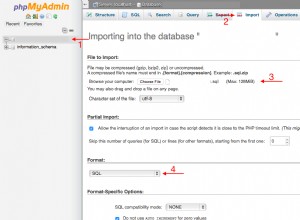Puede que esté un poco equivocado con la sintaxis, pero esta consulta parametrizada (todos los ? toman el '1' de la pregunta original) debería ejecutarse rápido, básicamente 2 búsquedas B-Tree [suponiendo que el número esté indexado].
SELECT * FROM
(
(SELECT id, number FROM t WHERE number >= ? ORDER BY number LIMIT 1) AS above
UNION ALL
(SELECT id, number FROM t WHERE number < ? ORDER BY number DESC LIMIT 1) as below
)
ORDER BY abs(?-number) LIMIT 1;
El plan de consulta para esto con una tabla de ~5e5 filas (con un índice en number ) se ve así:
psql => explain select * from (
(SELECT id, number FROM t WHERE number >= 1 order by number limit 1)
union all
(select id, number from t where number < 1 order by number desc limit 1)
) as make_postgresql_happy
order by abs (1 - number)
limit 1;
QUERY PLAN
--------------------------------------------------------------------------------------------------------------
Limit (cost=0.24..0.24 rows=1 width=12)
-> Sort (cost=0.24..0.24 rows=2 width=12)
Sort Key: (abs((1::double precision - public.t.number)))
-> Result (cost=0.00..0.23 rows=2 width=12)
-> Append (cost=0.00..0.22 rows=2 width=12)
-> Limit (cost=0.00..0.06 rows=1 width=12)
-> Index Scan using idx_t on t (cost=0.00..15046.74 rows=255683 width=12)
Index Cond: (number >= 1::double precision)
-> Limit (cost=0.00..0.14 rows=1 width=12)
-> Index Scan Backward using idx_t on t (cost=0.00..9053.67 rows=66136 width=12)
Index Cond: (number < 1::double precision)
(11 rows)




